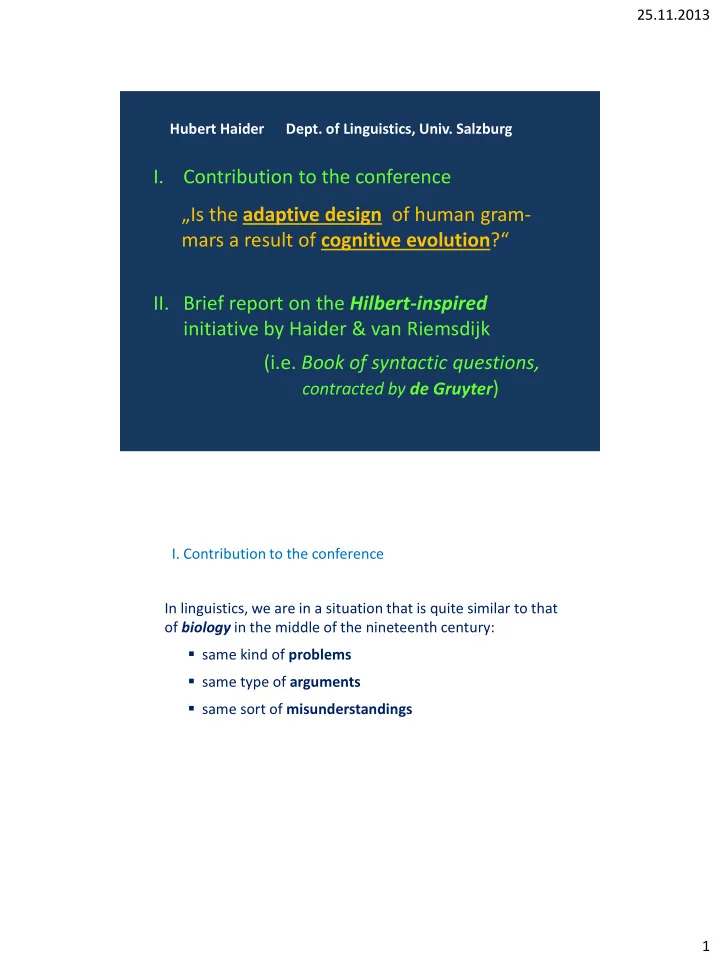

25.11.2013 Hubert Haider Dept. of Linguistics, Univ. Salzburg I. Contribution to the conference „ Is the adaptive design of human gram- mars a result of cognitive evolution ?“ II. Brief report on the Hilbert-inspired initiative by Haider & van Riemsdijk (i.e. Book of syntactic questions, contracted by de Gruyter ) I. Contribution to the conference In linguistics, we are in a situation that is quite similar to that of biology in the middle of the nineteenth century: same kind of problems same type of arguments same sort of misunderstandings 1
25.11.2013 Amundson (1998:154). “ The most important and widespread biological debate around the time of Darwin was not evolu- tion versus creation, but biological functionalism versus [transcendental] HH structuralism .” (p. 153): “ The primary theoretical goal […] was the explana- tion of biological form ” […] Imagine a Hilbert conference on biology then, …. Amundson, Ron (1998): Typology reconsidered: two doctrines on the history of evolutionary biology. Biology and Philosophy 13: 153 – 177. Amundson (1998:154). “ The most important and widespread linguistic debate around the time of Darwin was not evolu- tion versus creation, but linguistic functionalism versus [transcendental] HH structuralism .” (p. 153): “ The primary theoretical goal […] was the explana- tion of linguistic form ” […] Imagine a Hilbert conference on linguistics , …. Amundson, Ron (1998): Typology reconsidered: two doctrines on the history of evolutionary biology. Biology and Philosophy 13: 153 – 177. 2
25.11.2013 How to avoid the very same pitfalls … Is the adaptive design* of human grammars in terms of their computational ‚ ease ‘ for usage a result of the cognitive evolution of grammars as cognitive self-replicating systems? In other words: *) Why is it so that the luxurious structures determined by human grammars are so easily processed in actual usage and in language acquisition despite of their computational complexities. Cognitive evolution Darwin (1871: 59) “The formation of different languages and of distinct spe- cies , and the proofs that both have been developed through a gradual process , are curiously parallel .” 3
25.11.2013 Evolution = • a self-replicating system • & variation • & selection adaptation Cognitive Evolution = • a self-replicating cognitive system • & variation • & selection adaptation 4
25.11.2013 ‚ Grammar ‘ = neuro-cognitively represented knowledge system • self-replicating system (in language acquisition) • & variation in the process of replication • & selection by the computational restrictions of the brain routines engaged for the acquisition and use of grammar. Cognitive evolution adaptation (between grammar & usage systems) „ The origin of grammar ‘species’ by means of natural selection, or the preservation of favoured grammar ‘races’ in the struggle for life” II. Brief report on the Hilbert-inspired initiative by Haider & van Riemsdijk Hilbert‘s endeavor interpreted as a ‚ wisdom of the crowd ‘ approach i.e. „Let‘s share research questions !“ 5
25.11.2013 Hilbert Questions Combination of two independent motives: communicating productive questions (rather than publishing hypothetic answers ) attempting to focus a field on well-posed questions (“ Try to find a proof for …”) Hilbert Questions In empirical disciplines, productive questions are hardly ever well-posed (as in maths) ‘ well-posed ’ = the relevant facts are all known & covered and in the field there is consensus on the standards of demonstrative verification (‘proof’) of the validity of the answer. 6
25.11.2013 What Henk & me have been soliciting: Questions/theses (of the following categories) i. Generalizations that hold of cross-linguistic facts . In other words, formulate what you think could become remembered as “Y’s conjecture” (with Y as the variable for your name). ii. Generalization over facts of a particular language = language-specific case of (i.). iii. Theoretical issue : a novel theoretical claim iv. Your favourite question : “ The question I always wanted to find an answer for , …” Presently : There is still room enough in the book for more questions. A synopsis of the contributions Henk will show you in the gene- ral discussion session. 7
Recommend
More recommend